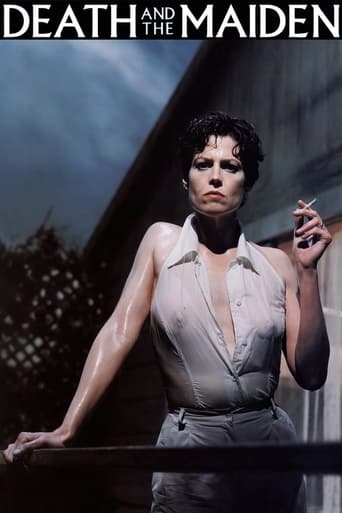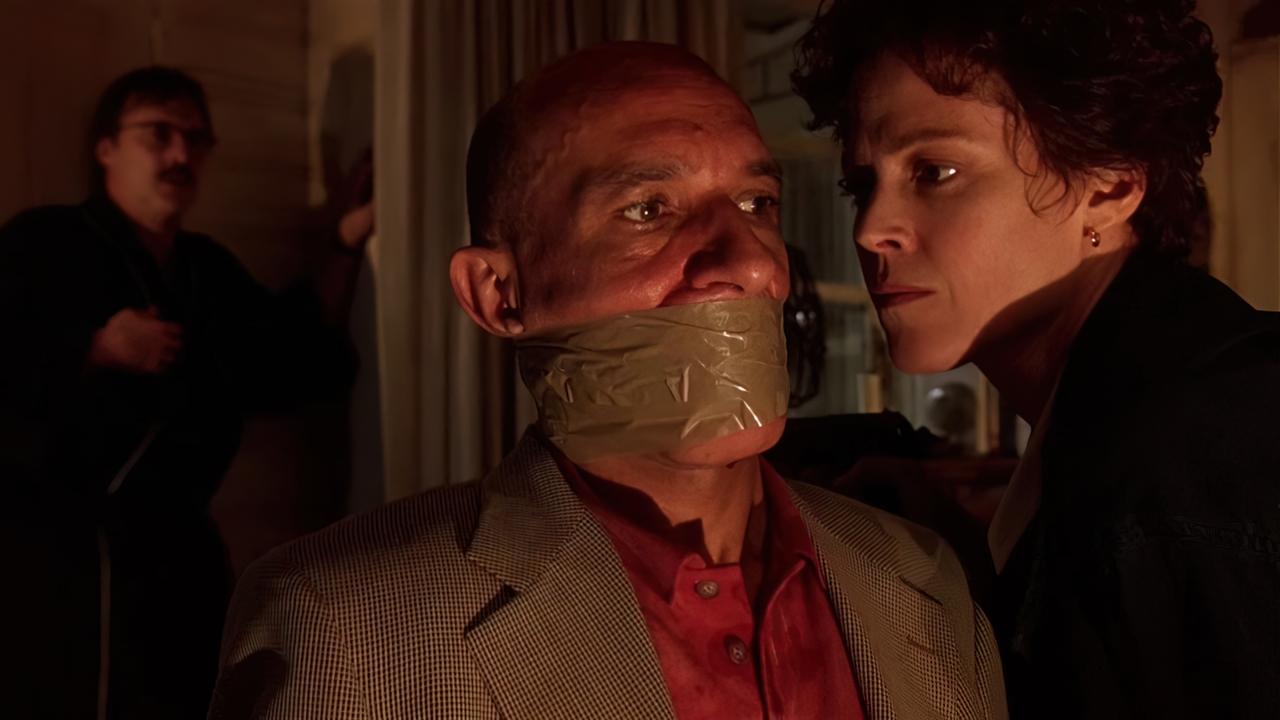tedg
Films like this generally are problematic. They are written as plays and kept as plays when carried over, so the filmmaker is limited to a preset notion of the space."Rope" was taken as a challenge in this regard, with a master visionary exploiting the confinement. It was, in effect, a learning experience for him without much reward for us, beyond what the play itself carried. Here in this film, we have something similar I believe. Polanski is a rare talent, a filmmaker that understands confinement — indeed his whole life is defined by the concept. He was approached to direct-for-hire and took the job, I believe, because he wanted a similar learning experience.So what we have here is a screenplay that was frozen before the man started his film and which he has taken unaltered. Someone else selected the actors, making what I think were bad choices. On this, Polanski designed the eye, making what I see as a whole different movie on top of the play.The play is about a woman who had been victimized by state torture. She believes she has encountered her torturer; the film is about the encounter and the extent to which you can trust her narrative or the accused. Her husband presides; he is literally a lawyer selected by the new president to sort out just these sorts of conflicting truths. The question is: will the accused confess? Well he does before the film is over, but was his confession true? Neither one of these two gives us much reason to trust them as characters. They both are liars. What Polanski does is subtly more the stance of the camera so that we alternate between who is the narrator so far as the lines compared to who is the aligned watcher and whose narrative space is tentatively trusted. It is a remarkable exercise, of just the kind that he would devour.I believe he used these skills in a similar weave of untrusted narrative in his next film, "Gate," which I think is an unappreciated masterpiece. But unless you happen to be tuned into this movie on a movie, this narrative about narrative, you will find this a pretty tame encounter.Unless you happen to live in a country that sponsors torture.Ted's Evaluation -- 2 of 3: Has some interesting elements.
RResende
This is one of the cinematic homes for this filmmaker. He swims comfortably in these waters. Polanski requires very little elements to induce great tension in any film. That's why he has looked for scripts like this, often in his career.This is a great thing, the ability to take very few scenery elements, in this case a single very small house, and the surrounding landscape, and build the narrative over that. Because that's what we have. The story is simple enough to produce no distractions, and the landscape is wide and desert enough to do the same. What we have is a whole set up that surrounds an idea of uncertain truth, provisional reality (to our eyes). That's why we never stop wondering whether Weaver is right or wrong, whether Kingsley is a rapist or a victim. So does Stuart Wilson, who goes through the same range of doubt as we, spectators, go, and that makes him our surrogate in the film. We are judges to our own sentence. All the cruelty of an invented regime of a supposed south American country is the mere formalization of the credibility of the world. It is not about denouncing crimes nor about discussing politics, as it has been said. Also, much has been said about how much the final monologue reveals the truth, i say it keeps all the possibilities opened, though it suggests sincerity.As an idea, this is as simple as it gets, and as every simple idea, it's so hard to achieve, keeping it simple. That's where things get interesting, when you check the cinematic devices that surround and collaborate with the simplicity of a simple doubt that this theatrical script suggests.First we have the core of the story framed, at beginning and end, by the core music, a quartet which names the film, and gives consistency to the drama of Sigourney's character.We have the handling of the wide open landscape, with its lighthouse. The sense of green isolation, the poetics of the location, which growths on us, as it is given in small bits, until becoming the final stage to the real drama.The house. This part matters, as this a film by a director who really knows how to handle space and include it in the drama. This is worth for a hotel room, a boat, or a small house. This is what he has been making throughout his life, in "knife in the water", his apartment trilogy, bitter moon and this one. It is something i admire, the ability to include the space that surrounds the characters into their dramas and discussions. That's one way, one of deepest ways to include (architectural) space in the fields of cinema. Orson Welles, Hitchcock (sometimes), Polanski... they all trust on their own camera.We have the acting at the center of the success of this film. Everyone of the 3 actors involved play at their top here, each one knows where he stands, and interprets perfectly what is required of him to make things flow. Ambiguity, to Ben Kinsgley, Messed up mind to Sigourney Weaver, Reactiveness and indecision to Stuart Wilson.This is less achieved than other efforts, but Roman never ceases to deliver his special gaze, and that's always worth seeing.My opinion: 4/5http://www.7eyes.wordpress.com
evanston_dad
"Death and the Maiden" tells a harrowing story, one that's not meant to be pleasant. But even so, there is a difference between telling an unpleasant story and creating an unpleasant experience, and unfortunately, director Roman Polanski doesn't maintain that distinction with this film.He's proved that he knows how in other films, like "Rosemary's Baby" and "Repulsion," neither of which dwell on pleasant themes but both of which are exhilaratingly entertaining. "Death and the Maiden" is an oppressive slog, a film that must be endured rather than enjoyed. Sigourney Weaver and Ben Kingsley give top-notch performances, but the whole thing is too one note and aggressively depressing to be very good.Grade: C
lastliberal
Roman Polanski's film is raw and exciting as you are literally on the edge of you seat wondering just what is going to happen next.It is based upon a play, so there are only three characters, but that is all it needs.Sigourney Weaver is a torture survivor from a Latin-American country. Pick one, we have been complicit in torture in many of them. She is married to Stuart Wilson, who has just been picked to head up a new commission to bring torturers to justice, but only those who have killed. There will be nothing for survivors like Weaver.Enter the great Ben Kingsley, who just happens to pick up her husband after a flat tire. She recognizes the voice - or she says she does. The rest of the story is how she is convinced he is her torturer and captures him to force a confession.This is where it gets raw and powerful as she recounts what was done to her while trying to get a confession. Her husband is caught in that trap where you support your wife, but you don't quite believe her to be right.It was compelling, and all three actors made it a film that should have gotten wider recognition.


 AD
AD






